|
Psoriasis Rehabilitation
Psoriasis is a common immune-mediated
chronic skin disease, which is frequently found on the skin of
knees, elbows, scalp, hands, feet or lower back. The skin cells
of the patients mature and move rapidly up to the surface of the
skin over three to six days, instead of normal 28 days. It
generally appears as patches of raised red skin covered by a
flaky white buildup and can cause intense itching and burning.
Psoriasis affects 2 to 2.6 percent of the United States
population, or between 5.8 and 7.5 million people.
There are five types of psoriasis. They are
plaque, guttate, inverse, erythrodermic and pustular type. The
results of clinic treatment largely depend on the type of
psoriasis. It is very important that you talk with your
physician about what course of action to take with your type of
psoriasis.
There is no blood test for psoriasis.
Physicians usually diagnose it by examining the affected skin.
Psoriasis may be triggered by emotional
stress, injury to the skin, some types of infection or reaction
to certain drugs. Many treatments are available to help manage
its symptoms.
It is believed that “Psoriasis and
psoriatic arthritis have no cure[1],
but people have a wide range of treatment options to help them
gain control over their disease. Many different therapies can
reduce, or nearly stop the symptoms of psoriasis and psoriatic
arthritis. No single treatment works for everyone, but something
is likely to work in most cases. Individuals may need to
experiment before they find a treatment that works for them.”
Treatment in conventional medicine
In conventional medicine, there are three
major ways to treat psoriasis in conventional medicine.
(1). Sunlight and topical agents (external
therapies), which include the use of steroids, coal tar,
calcipotriene, anthralin, salicylic acid, and other topicals.
(2). Phototherapy, which involve the use of
Sunlight, ultraviolet light B, lasers (pulsed dye and excimer),
and PUVA (psoralen plus ultraviolet light A).
(3). Systemic (internal) medications
usually are reserved for patients with moderate to severe
psoriasis or disabling psoriatic arthritis. They also are used
for erythrodermic or pustular psoriasis. The drugs that may be
used include: Methotrexate, oral retinoids, cycloporine,
biologics (made from living sources, such as viruses, animals
and people and must be injected or infused into the body, rather
than taken orally), and other systemics (such as Hydroxyurea,
Mycophenolate mofetil, Sulfasalazine and 6-Thioguanine).
(Data source:
http://www.psoriasis.org, cited Feb. 13, 2004
http://www.niams.nih.gov/hi/topics/psoriasis, cited Feb. 13,
2004)
How psoriasis can be improved by
Traditional Chinese Medicine (TCM)
In TCM, following therapies are used for
the treatment of psoriasis:
Acupuncture: including the acupuncture
point injection of herbal preparations.
Chinese herbal therapy: applied orally or
topically, in injection or in infusion into circulation.
Herbal therapy for psoriasis
Principally, TCM believes that Psoriasis is
caused by blood-heat, blood-dryness and blood-stagnation.
Progression of psoriasis causes accumulation of toxins,
wind-damp invasion into meridian, and exhaustion of Yin[2]
by heat toxins in the blood.
Herbs used for the treatment of psoriasis
largely depend on the stage of the disease and the condition of
individuals.
Generally speaking, the cure rate of
psoriasis with herbal therapy is between 50% and 80%, depending
on the herbs used, with or without topic application of the
herbs, etc. Following figures show only some of the clinic
experiments in
China.
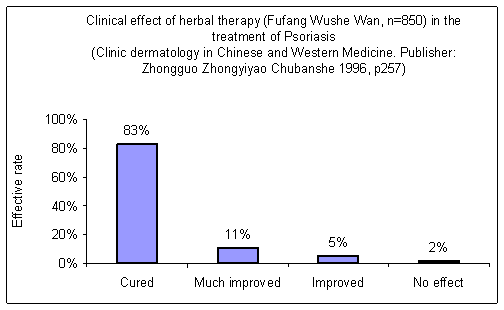
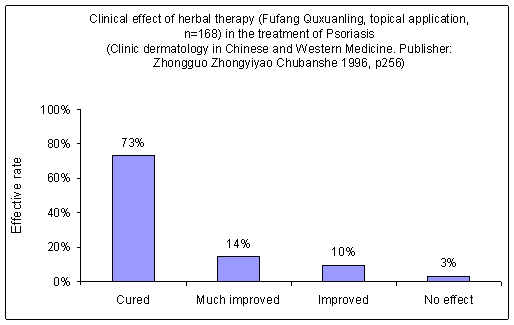
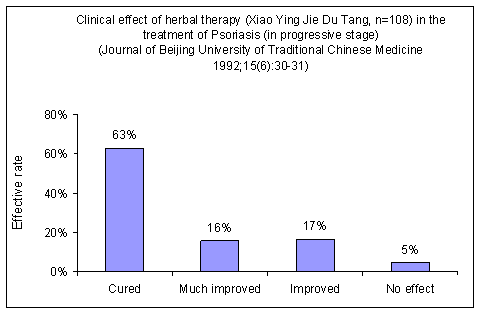
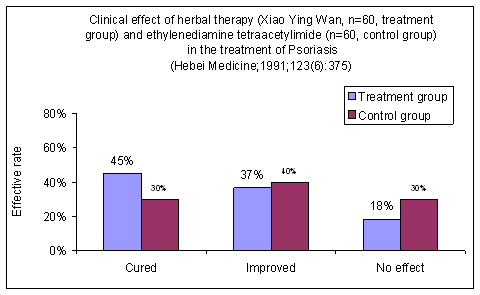
Herbs can also be prepared into an infusion
or injection. These make herbal therapy simple in clinic, as
dosage can be strictly controlled.
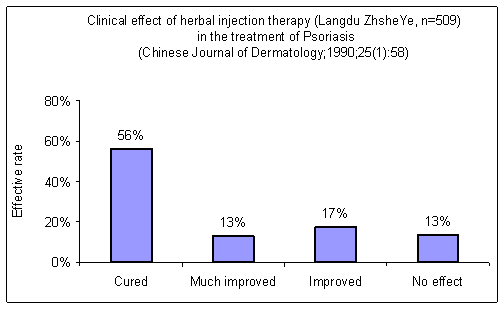
Acupuncture
When used for psoriasis, acupuncture can
also yield significant positive results.
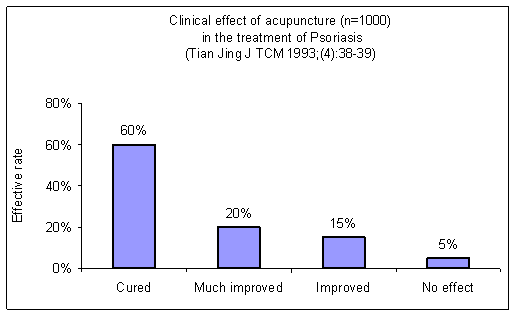
String implantation therapy
String implantation therapy means to
implant a string made of sheep intestine material into
acupuncture point. The technique has been long used in
Traditional Chinese Medicine for the treatment of asthma,
chronic bronchitis, and other disease. When used in psoriasis,
the results are encouraging as well.
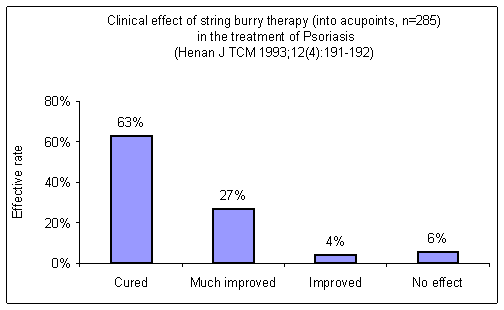
Other therapies
Since patients with psoriasis experience
much stress including significant distress from the symptoms of
the disease, Qigong therapy is recommended.
Suggestions
1. Readers should realize that for early
stage psoriasis, to reduce the skin lesion is not so difficult
anyway. However, it is easy to relapse. To prevent the relapse
is in deed the challenge to any medical systems, conventional
medicine or the TCM.
2. To reach complete cure, one needs to
have the TCM treatment every year. The treatment should be
sometimes every year for some years. It is similar to the TCM
treatment for asthma that needs a year-by-year maintenance. The
difference is: patients with asthma need the TCM maintenance
mostly in summer every year, the psoriasis may need it in
winters. The maintenance is to change body constitution so that
it is not so sensitive to environmental stress.
3. It can be said that there is almost no
way for conventional medicine to help people with skin
disorders. The drugs used by the conventional medicine do not
work properly or have more side effects (such as the use of
steroid hormones). In another words, skin disorders is one of
the area in which TCM works better than the conventional
medicine. People is recommended to try the TCM first or get a
second opinion from his/her TCM doctors before use any steroid
products).
4. If the skin lesion is isolated, it is
recommended to use potato slice to try. You can cut the potato
(any kind) into thin slice. Put the slice onto the psoriasis,
leave for 10 to15 min until it turns warm as your skin. Take it
off and put on a new slice. Repeat it for 3 to5 slices every day
for several days. It takes only 2 to 3 days test to tell if this
folk therapy works or not.
[1] This is the
comments of conventional medicine, does not mean that
TCM doctor agree with it.
[2] Yin here means
the Yin in the Chinese Yin and Yang theory.
|















